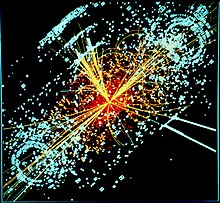As you may know scientists at the Large Hadron Collider at CERN in Switzerland are currently searching for some mysterious elemental particles. At the same time cosmologists are struggling to make sense of the universe (or is it universes?) debating whether space is expanding, contracting, static or made of strings. They debate how many dimensions they need to make the theories work. The search for a grand unified theory bringing together the subatomic and cosmological scales continues.
Now here's a thought: are we looking in completely the wrong places? Is it conceivable that within each atom there exists an entire universe? And within each atom within this universe there are yet more universes, and so on for ever? In the opposite direction (outwards) are we just part of the space dust that makes our universe a microscopic part of something yet larger, and so on for ever? And do these diverging scales somehow fold back into a unified whole?
I am neither a cosmologist nor a particle physicist and my knowledge of quantum mechanics was limited to some difficult lectures in my last year at university in 1970, but I do remember the sense of awe and wonder when told that everything could be viewed as a wave function existing in all space and all time: somehow we are already everywhere (statistically) and we exist in all time forwards into the future and backwards into the past (statistically). What I am speculating is that the macro and the micro world could be one and the same.
Search This Blog
Showing posts with label cern. Show all posts
Showing posts with label cern. Show all posts
Thursday, 5 January 2012
Friday, 18 November 2011
Time travel in quantum universes?
Although not a particle physicist I am fascinated by the news that CERN scientists have repeated their recent neutrino experiment and yet again confirmed that neutrinos seem to be travelling faster than light, despite theory saying this is impossible. This work may still be in error and the results may yet prove false. More tests are being carried out at other research centres over a longer timescale to see if the results hold up.
If true however, it raises all sorts of questions about the nature of space-time and our ability to move about in its many dimensions. Will we, one day, be able to look into the past and future? Maybe not in a way that allows us to interact, but simply look at who are ancestors were and our descendents will be.
Theories will have to be re-written and who knows where this will take us.
If true however, it raises all sorts of questions about the nature of space-time and our ability to move about in its many dimensions. Will we, one day, be able to look into the past and future? Maybe not in a way that allows us to interact, but simply look at who are ancestors were and our descendents will be.
Theories will have to be re-written and who knows where this will take us.
Subscribe to:
Comments (Atom)
